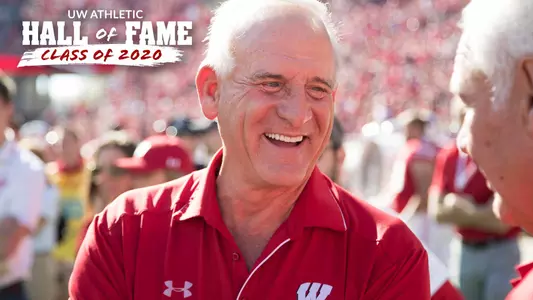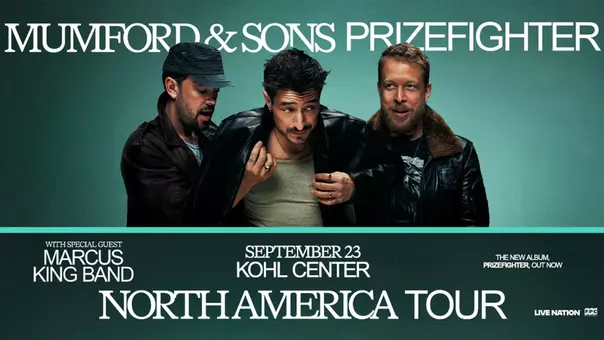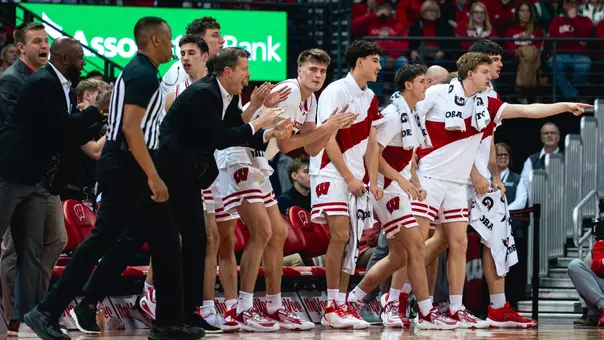
2020 UW Athletic Hall of Fame: Ted Kellner
June 17, 2020 | General News, Men's Basketball, Mike Lucas
Former Badger’s pride and love for UW is rooted in family and sports
 |
||
|
The 2020 class of the UW Athletic Hall of Fame has been selected and new members will be announced from June 15 - 26. Visit UWBadgers.com each day to celebrate each new member of this distinguished and historic class of Badgers!
BY MIKE LUCAS
UWBadgers.com Senior Writer
MADISON, Wis. — Bridging the competitive worlds of business and sports through family philanthropy, Ted Kellner has been an enthusiastic supporter and generous financial contributor to all things Wisconsin during bull and bear markets, winning and losing seasons, good times and bad.
In 1997, he was especially bullish and personally vested in a UW Athletic Hall of Fame class honoring quarterback Ron Vander Kelen, a co-star with Pat Richter of a furious fourth-quarter rally in the 1963 Rose Bowl; and jumping-jack Joe Franklin, a double-double machine for men's basketball coach John Erickson in the mid-60s.
But his focal point was on someone else.
Also inducted that year was a Badger team captain and All-American in track and field; a Big Ten high hurdles champion who was generally overshadowed in the mid-1930s, like everybody else in the Western Conference and on the planet, by Ohio State's incomparable Jesse Owens.
"My dad was my dad; my mentor and my best friend," Ted Kellner said. "He was a hell of a businessman and world-class hurdler who instilled the love of business and sports in me early-on. I remember we put up spotlights on the garage so I could shoot at night and he'd pass the ball to me."
Recalling, too, the drive from their Grafton, Wisconsin home to downtown Milwaukee on Saturdays, he said, "I used to read the Wall Street Journal driving in with him to his office and we'd talk a little bit about business and then I'd go play basketball at the Milwaukee Athletic Club. That was my routine."
Punctuating the family symmetry — like father, like son — Kellner was "flattered and then kind of stunned" upon learning of his induction into the UW Athletic Hall of Fame as a special services member in the Class of 2020. In his heart, he knows Jack, who passed away in 2001, would have been proud.
"My dad was a special person and to be in there with him is special as well," he said. "You know how much I love Wisconsin. It's hard to put into words. I'm humbled, I'm honored, I'm excited about it. Obviously, it isn't for my athletic prowess. But athletics have played a huge role in my life."

Barry Alvarez can attest to Kellner's passion, generosity and love of Badger athletics.
"He has been one of my best friends," said Alvarez, whose Camp Randall office is located in Kellner Hall named after Ted and his wife Mary. Both are UW grads. Three years ago, on Homecoming weekend, the couple donated $25 million to the school's All Ways Forward comprehensive campaign.
"I met Ted on my first week on the job (in 1990) — John Jardine introduced me to him, and we just hit it off right away. We're the same age. We graduated in the same class (1969). He's one of the most generous people that I've ever been around. He loves the Badgers. He's loyal to the university. He cares.
"His father, Jack, was the same way. Ted is a clone of his dad. Great people. And people like the Kellners allow you to compete at a high level collegiately. If you don't have caring people like them associated with your program, athletically and academically, you're standing on the outside looking in."
Kellner is the co-founder and former chairman and CEO of Fiduciary Management Inc., in Milwaukee; a successful asset-management firm that offers equity investing strategies. He's also the co-founder and executive chairman and majority shareholder of Fiduciary Real Estate Development.
Craig Raddatz, an ex-UW linebacker and team captain, is an executive vice president at the development firm. Dating back to his playing days for head coach Dave McClain in the mid-80s, Raddatz was one of the earliest beneficiaries of Kellner's summer internship program.
"Craig did it for two years in a row and it was really a hands-on internship," Kellner said. "We've had 160 some kids come through, quote, the program, over the last 36 years. They got exposure to the investment world and they learned something that hopefully would be beneficial later in life."
In 2002, Ted and his brother Jack W. Kellner and their families presented a $10 million gift to the Wisconsin Foundation, $6 million of which was earmarked for the Camp Randall Stadium renovation project. Jack F. Kellner and his two sons also donated $2.5 million to the building of the Kohl Center.
"Sports has been such a big part of my life — I just like to be part of a team," said 74-year-old Ted Kellner, who's six months older than Alvarez. "It's kind of trite, but sports really do teach you a lot about life and business and about how to get up when you get knocked down.
"When I give speeches, I talk about sports and the rule of play in your life. They teach you how to be a good teammate. They teach you how to be graceful in winning. They teach you how to get back off the mat when you lose. All those traits are really critical in business as well.
"We all go through tough times and the ones who are successful are the ones who can keep their eye on the ball when things don't go well, whether in business, the stock market or whatever. You don't get down. You don't fold. You just keep coming back at it, coming back at it, until you get it right.
"Take whatever you can learn from the tough times and make yourself and the process better.
"That transcends sports. And that transcends business."
The legendary Warren Buffett would be the No. 1 overall pick in most investment drafts.
One of Buffett's favorite sayings is, "Price is what you pay. Value is what you get."
Kellner picks up the story from here.
"When I graduated from business school," he said, "my dad was going to give me $2,000 in cash — which was then a King's Ransom — to buy a car. I said, 'Loan me another $2,400 bucks' because I wanted to buy 100 shares of Berkshire Hathaway (Buffett's company) which I did and held on to."
He's still spiking the ball in the end zone on that purchase.
At the UW, Kellner's adviser/mentor was Frank Graner, a nationally-renowned business professor.
"I ran into Frank when I was a sophomore and I was trying to figure out what element and area of business I wanted to get into," he said. "He was an icon in the world of finance. I never had him for a business class. But I'd go up on Friday afternoons and talks stocks and investments with him.
"With the combination of Graner and my dad, I fell in love with the stock market."
While Buffett may be known for quotations, Kellner doesn't subscribe to a specific one.
A business model, to his thinking, is more important than a motto.
"It really does emanate from sports," he said. "You've got teammates and you don't necessarily select those teammates. But you have to trust them and believe in them. And you need them to be kind of a support system. You have to expect of them their best, and they, in turn, expect the best from you.
"What I did in the money management company and the real estate company is try and find the best people and trust them. Expect the best. Give them free reign. Work with them. But let them do their thing. You have to surround yourself with talented people, with hard workers and let them go.
"One of the strengths that I have is the ability to pick good partners.
"It's not a mantra per se, but it's a mindset.
"And there's a little bit of a takeaway from sports.
"My success is really due to my teammates in business."
And in life.
Ted and Mary met on campus. Besides an undergrad degree in elementary education from the UW, she has a doctorate in education from Cardinal Stritch. Mary is the president of the Kelben Foundation which has provided a score of college scholarships to under-privileged students in Milwaukee.
On the $25 million gift to their alma mater, Ted reflected, "Knowing what we did that day (in 2017) was going to pave the way for other kids to get that full Wisconsin experience was an incredible feeling for me and Mary. Hopefully it gives them the tool kit to better themselves and better their lives."
• • • •
Alvarez likes to needle the people in his inner circle. At functions, he has teased Kellner by feigning a temporary memory loss during his introduction — "I can't remember the name? Oh, yeah, that's right, you're Jack's boy" — or suggesting "Ted never saw a shot that he didn't like" in basketball.
"I tease him all the time," Alvarez said. "All the time."
"He's unmerciful," Kellner agreed. "Unmerciful."
It was Alvarez that informed Kellner of his Hall of Fame selection. It just so happened that they were on a trip together with a couple of other buddies, the perfect setup for an Alvarez zinger. Especially since everyone was aware Kellner was a Badger walk-on for a couple of years under Erickson.
"I called everyone together," Alvarez recounted. "And I told Ted that he was just voted into the Wisconsin Athletic Hall of Fame. And I said, 'You were one vote away from being unanimous.'
His curiosity piqued, Kellner responded, "Really? Who was that one vote."
"John Erickson," Alvarez said.
Mic drop.
Kellner, by his own admission, was a "decent" athlete. At Grafton High School, he won a conference title in the hurdles due in part to the techniques that he picked up from his dad. He also played on some winning basketball teams noting "I could shoot, I could jump, but I was slow."
In the fall of 1964, Erickson invited Kellner to join the Badgers as a freshman walk-on. The aforementioned Joe Franklin was in his class. Over his three seasons of competition (freshmen were ineligible), Franklin averaged 16.9 points and 11.9 rebounds with 47 double-doubles, still the record.
Kellner injured a knee his first year. He was a scout teamer as a sophomore.
"At the beginning of my junior year," he said of a consultation with Erickson, "we mutually agreed my time was better spent in my business career. I say facetiously that he invited me to walk-on as a high schooler and then he invited me to walk-off. I was decent, but not at that Big Ten level."
Kellner enjoyed being around Erickson who died in May. He was 92.
"He was a wonderful guy and he always treated me respectfully," Kellner said. "When I was cut from the team, I felt bad for him because it was tough for him to do it. I remember distinctly when he told me, I felt worse for him than I did for me. He was a genuine, sincere human being.
"Every time I saw John, he'd give me a hug and ask how I was and how the family was doing.
"He was just an all-around good person."
Not unlike the late Ab Nicholas, another Milwaukee investment giant and philanthropist. In the early '70s, Kellner worked for Nicholas, a second-team Badger All-American in basketball. Nicholas and his wife Nancy Johnson donated $10 million to the Kohl Center construction of a practice gym.
"I learned a lot with Ab," Kellner said. "He built a heck of a firm."
A year ago, Jim Kalscheur, the founder of UW Provision and another big-hearted Badger booster went into the UW Hall of Fame for his charitable service to the athletic department. Kalscheur passed away in April. He was 91. Another huge basketball supporter, Curt Mueller, died last October.
What has been the common denominator with all these men?
"That's an easy one," Kellner said. "It's the love of the University of Wisconsin in every aspect."
Mic drop.
2020 UW Athletic Hall of Fame
- Aaron Gibson, Football
- Carla MacLeod, Women's Hockey
- Ted Kellner, Special Service
- Jackie Zoch, Women's Rowing
- Mike Wilkinson, Men's Basketball
- John Byce, Men's Hockey and Baseball
- Tom Burke, Football
- Jessie Stomski, Women's Basketball
- Dick Bartman, Boxing
- Jeff Braun, Men's Track and Field
- Bo Ryan, Men's Basketball














